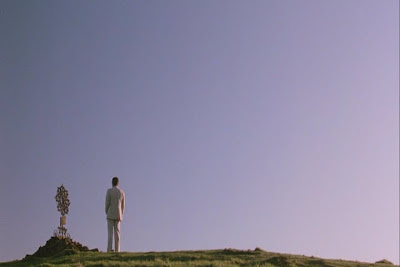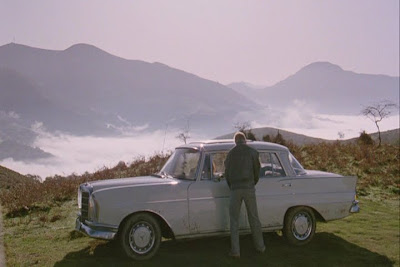
Becoming a Tim Roth fan after first seeing Reservoir Dogs at 17 has led me to some great films (Made in Britain, The War Zone), some okay films (Rosencrantz & Guildenstern Are Dead, Rob Roy) and utter shit films (almost everything after the Hollywood crossover?) Though his career post 1995 has been lackluster in terms of quality (to put it lightly) I was happy to hear that Stephen Frears' The Hit, one of his breakout roles and a film then little known in the US, was getting a DVD release through Criterion.

The Hit was a film of failed assumptions, in my case. Nobody is what they appear to be, stock characters are abandoned. Both Roth and John Hurt (another favorite) play unexpected roles. Roth initially seems to fall into his typical psychopathic baddy, but becomes something far more likeable. Hurt is out of character because he's ruthless. It actually felt odd at first to see him as Braddock, which works to his advantage. While it isn't surprising to see Roth screaming and waving his gun around as Myron, it's always a shock when Hurt commits to his threats.

Terence Stamp, as Willie, is an extremely calm victim, exhibiting complete control over his captors at all times. When confronted about his inexplicable acceptance of his death, he spouts bits of philosophy on its role in the human cycle. Myron and Braddock try to understand, but can't.

The handling of Willie's fate was easily my favorite moment in the film. Not only was it what surprised me most, but it felt far more realistic, more pathetic, and much more satisfying than what I was expecting. The Hit was a great, breezy crime film, and this scene was its crown. I won't easily forget it, nor do I hope that I ever do. Films ought to humanize their characters like this more often (when it fits, anyway).
Rounding out a great cast are Laura del Sol (who is stunning, strong and provided 2 solid "cringe!" moments for myself) and Bill Hunter (and his lovely toupee).


It also needs to be said that The Hit is a treat just to look at, and not simply because of its beautiful Spanish setting. The compositions of its scenes are played with constantly. Seeing as this is far from a standard thriller, it makes sense that it looks nothing like one either. (My caps do it no justice. It needs to be seen to be appreciated.) Aesthetically, it feels quite modern for a film made over 25 years ago.

Overall, an unexpected and total delight.






